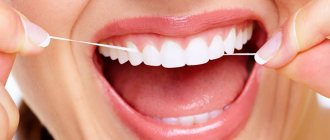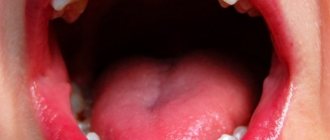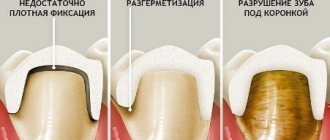Bad breath: causes
Where do halitosis legs grow from? There are many factors here:
- Caries and its complications (pulpitis, periodontitis, periostitis and other inflammatory dental diseases).
- Periodontitis and periodontal disease. Periodontal pockets accumulate plaque and microorganisms, as well as decaying food debris.
- Inflammatory diseases of the oral mucosa
- Pathologies of the ENT organs (sinusitis, laryngitis, tracheitis), as well as rhinitis
- Dry mouth. Insufficient saliva production leads to disruption of the self-cleaning process, which creates excellent conditions for the proliferation of bacteria (remember what your breath smells like in the morning, because there is little saliva at night). Their waste products create an unpleasant odor. A similar situation occurs with nasal congestion and forced breathing through the mouth when the mucous membrane dries out.
- Diseases of internal organs (especially the gastrointestinal tract).
- Parasitic infestation
- Poor oral hygiene
- Improper care of dental structures (braces, dentures).
A consultation with a dentist and, if necessary, doctors of other specialties will help you find out the true cause of the unpleasant odor. You may need to undergo additional examination (for example, FEGDS if gastritis or a stomach ulcer is suspected, or scraping for inflammatory diseases of the mucous membrane).
Which doctor should I contact?
If an unpleasant odor appears, the first step should be a visit to the dentist. This doctor will be able to help in the vast majority of cases. If no problem is detected, it is the turn of a nutritionist and gastroenterologist. Most likely, in this case, you will have to take additional blood and urine tests. Depending on the results obtained, a specific specialist will treat the problem: for problems with the thyroid gland - an endocrinologist, for kidney diseases - a urologist, for pathologies of the respiratory system - an ENT specialist or a pulmonologist.
You can get rid of an unpleasant odor only by establishing an accurate diagnosis. Therefore, if the problem persists longer than 2-3 days, it’s time to start an examination!
The information is for reference only. Before treatment, consultation with a doctor is necessary.
The root of the problem is microorganisms
Why is bad breath so persistent and appears again and again? To deal with the problem, you need to understand the mechanism of its occurrence as a whole. As you know, the mouth is a “home” for many bacteria, microorganisms, and fungi. Naturally, like all living organisms, they feed and excrete waste products. The more plaque there is on the teeth, the more comfortable the bacteria feel, because their preferred environment is oxygen-free, and just such conditions are created under the layer of plaque. Microorganisms produce sulfur compounds, which have a pungent odor and feel repulsive. It is noteworthy that even if a person brushes his teeth thoroughly, in some cases (for example, progressive periodontal disease), deep periodontal pockets cannot be cleaned out on their own, and they become a source of foul odor. The same applies to plugs with purulent tonsillitis, when white lumps of pus accumulate in the lacunae of the tonsils.
What will help solve the problem?
If you have gastritis, you need to seek help from a specialist.
If this problem is not related to the regime and the digestive process, but is a disease, treatment and prevention of diseases is needed under the supervision of a doctor.
With such diseases, it is very important to consult a doctor for help, since prolonging the disease can lead to more serious consequences. In such situations, diseases require long-term treatment.
It is also worth remembering that not all medications can be taken without consulting a doctor and a full examination. Most often, for gastritis, medications are prescribed that reduce acidity and help in the regeneration of the mucous membrane.
There may be cases when antibiotics and painkillers are needed, it all depends on the disease itself and the stage.
Bad breath in a child
In children, this problem is less common than in adults, because, as a rule, the average child has not yet developed chronic diseases of the gastrointestinal tract, and not all teeth have erupted. But what to do if you notice your child has bad breath? The reasons here are the same as in adults: in this way the body signals problems in the body. This means that there is a failure somewhere and a full examination needs to be carried out. In children of preschool and school age, adenoids may be a predisposing factor. The scheme is simple: adenoid growths block the path of air / breathing from the nose is replaced by the mouth / the mucous membrane dries out / saliva becomes scarce and bacteria multiply, giving rise to repulsive breathing. What if it’s just a baby? Many mothers are interested in what could be the cause of the problem if the child is one year old. Bad breath at this age can already appear due to the accumulation of plaque on the teeth (the norm is 8 by the age of one), the presence of worms, and the abuse of carbohydrate foods (cookies, sweets).
Important! You should be wary if you smell acetone from your mouth. You should contact an endocrinologist to be examined for diabetes and other electrolyte disorders.
dental clinic
Halitosis may be constant or appear from time to time. Anyone has experienced this condition at least once in their life, and for a quarter of the adult population, bad breath is a constant problem.
The insidiousness of halitosis lies in the fact that its owner often gets used to the smell and does not feel it himself. And the “well-mannered” people around them will not even think about offending a person with stories about his bad breath. Meanwhile, it would be much more correct to tactfully hint about the existing problem. This way you can get rid of barriers to communication, and in some cases, avoid a dangerous disease.
The exact opposite situation also happens - a person is aware of breathing problems, but instead of trying to eliminate the bad smell, he begins to carefully hide it. As a result, a person focuses more and more on his “defect”, does not think about his personal life, and tries to have less contact with others. So it's not far from depression. In psychiatry, there are also cases where such behavior arose due to a non-existent odor invented by the patient himself (this condition was called pseudohalitosis).
As with any disease, with halitosis you should not go to extremes, but recognize that there is a problem and start working to eliminate it. Indeed, contrary to popular belief, bad breath can be easily dealt with.
Where to “sniff out” the problem?
Most often, the cause of unpleasant odor is in the oral cavity itself. The simplest case is that the teeth and tongue are not brushed often or thoroughly. Food debris is decomposed by bacteria that constantly live between the teeth, at the edge of the gums and on the tongue, and some of the products of this decomposition give an undesirable aroma to the breath. By the same mechanism, odor appears during caries and gum diseases, such as gingivitis, periodontitis and periodontal disease. Tartar and plaque on teeth that contain large amounts of bacteria smell bad. Odor can also come from insufficiently clean removable dentures.
Bad breath also occurs with dry mouth - xerostomia, caused by diseases of the salivary glands, taking certain medications, and even long breathing through the mouth (for example, with adenoids). With xerostomia, saliva does not sufficiently wash the oral cavity, which causes the same putrefactive processes.
Everything is much deeper
What if your teeth, gums and tongue are healthy and cleaned to a shine, but there is still a smell? Then you need to remember what you ate shortly before its appearance. Because onions, garlic and certain types of cheese, when digested, release sulfur compounds that are absorbed into the blood and removed from the body through the lungs - that's the smell. Well, the fact that smoking and alcohol also do not contribute to a pleasant breath smell is generally a truism.
Another common cause of halitosis is respiratory diseases. Inflammatory processes in the nose (rhinitis, sinusitis), inflamed tonsils (tonsillitis), bronchitis, bronchiectasis, as well as an active form of tuberculosis, abscess and malignant tumors of the lungs are accompanied by tissue destruction. Because of this, the exhaled air will have an unpleasant smell of pus.
The gastrointestinal tract can also be a source of odor. With gastritis and gastric ulcer, as well as with diseases of the pancreas and bile ducts, the digestion of food and its movement through the gastrointestinal tract are disrupted. And poorly digested food, which is also stale, does not at all aromatize the breath. At the same time, a person is often bothered by a coated tongue and a sour or bitter taste in the mouth.
A specific odor from the mouth in some chronic diseases may indicate the development of dangerous complications. Thus, the characteristic putrid odor in liver diseases means that the liver cells have ceased to cope with the neutralization of toxic products from the intestines. The smell of ammonia signals serious kidney failure, and the smell of acetone in diabetes mellitus indicates the threat of a diabetic coma. By the way, fans of strict diets can also develop bad breath - due to too infrequent or monotonous nutrition. So, we have more or less figured out the reasons, and a natural question arises: “What to do?”
What to do
First, understand your oral hygiene. You should brush your teeth twice a day - after breakfast and before bed, using an elastic toothbrush in circular motions over all surfaces of the teeth. Along with your teeth, you should also brush your tongue - for this you can use a soft toothbrush or a special tongue brush.
It is better to choose a toothpaste containing fluoride and calcium (this will help strengthen tooth enamel) and with the addition of antiseptic plant extracts (they will reduce the activity of bacteria and improve the condition of the gums). After eating, it is recommended to rinse your mouth with water and chew sugar-free gum for one to two minutes. If food gets stuck between your teeth, flossing can help remove it.
It is also worth changing the attitude towards dentists - those times when the dental office was considered a branch of the Gestapo are long gone: both the equipment and the attitude towards the patient have changed.
If everything is fine with the oral cavity, but the unpleasant odor is still present, you will have to visit a general practitioner. He will conduct a diagnosis, determine the probable cause and prescribe treatment. Thus, you will get rid of not only halitosis, but also the disease that caused it.
Do it immediately
But what if a visit to the doctor is postponed for some reason, and you need to drown out the unpleasant odor right now? There are several options.
- Eat a crisp apple or fresh carrot - they will cleanse your teeth of plaque, and the plant fiber they contain will “collect” some of the odorous substances in the stomach.
- To kill the smell caused by eating something “wrong”, you can chew parsley, celery, dill, mint, tarragon, anise or fennel.
- Rinsing with infusions or decoctions of sage, calendula, chamomile, eucalyptus and other natural antiseptics will help deal with oral bacteria. Freshly brewed strong tea has a somewhat smaller, but undeniable effect.
- If halitosis occurs due to digestive problems, intestinal sorbents such as polyphepan, enterosgel, activated carbon and others will help cope with it.
- If you have problems with your tonsils, you should find time to wash out the lacunae with an ENT doctor twice a year, and also regularly gargle with decoctions of medicinal plants or propolis tincture.
How to get rid of bad breath
First, assess the scale of the problem. Bad breath in the morning after sleep is normal. To get rid of it, regular morning hygiene procedures (brushing your teeth, rinsing) are enough. If the reason is raging bacteria, it will be more difficult, but it is also possible to pacify them. What measures will be effective? How to remove bad breath and forget about the problem?
1) Diet correction.
The more protein foods you consume, the worse the “flavor”. By depriving bacteria of the ability to emit foul-smelling gases, you can significantly reduce the size of the enemy army. “More plant-based - less meat” - stick to this motto and you will notice an improvement from the very first days
2) Careful oral hygiene
Fortunately, the modern dental industry offers a huge number of teeth and gum care products for every taste and budget. Feel free to use ultrasonic brushes, irrigators, rinses, and flosses. To develop motivation in children, you can buy brushes in the shape of funny animals and organize competitions - who can brush their teeth better today? For those who wear braces or use dentures, we inform you (in case you didn’t know): there is a special series of care products for orthodontic structures (brushes, special brushes, etc.) that make dental care easier. Regular hygiene measures cleanse the oral cavity of bacteria and freshen breath. Don't forget about professional cleaning at the dentist every six months.
3) Stop smoking
Smokers do not notice how foul their breath is, and neither expensive cigarettes, nor lollipops, nor chewing gum can help. But others notice this very well. Leaving aside morals about the dangers of smoking, let's just say whether or not you smell decaying tobacco and the products of another 5,000 chemical compounds (there are about that many in cigarette smoke), it's up to you.
3) Eliminate the main problem
If the problem is in any specific disease, then no amount of rinsing or chewing gum will be able to remove halitosis; at most, they will mask it for a short time. Eliminate foci of infection in the oral cavity, treat your teeth, cure your stomach, tonsils, in other words, take care of all those health matters that you “didn’t get around to”, and the problem of unpleasant odor will be eliminated in parallel with the main treatment.
Medicines
How to remove bad breath using pharmaceutical products? It helps a lot, especially if you drank a large amount of alcohol the day before, the drug Atoxil, Polysorb. These drugs have an adsorbent effect, which consists in the rapid removal of alcoholic breakdown products from the body.
A solution of Chlorophyll, which contains a green pigment found in plants, will help in the fight against unpleasant odors. It has a deodorizing effect. In addition, regular use of the medicine helps to destroy microbes in the oral cavity, eliminate wounds and inflammatory processes in the gums.
Chlorophyll is also added to toothpastes and mouth rinses. The substance is found in spinach, broccoli, dill, etc. Therefore, these products must be included in the diet of a person with halitosis.
Hydrogen peroxide 3% eliminates stench for a long time and gets rid of pathogens. The rinsing procedure is carried out 2-3 times a day.
An effective disinfectant is Septagol. This is an antiseptic, which contains eucalyptus ester, mint, as well as thymol, menthol, benzalkonium chloride. The drug is able to destroy bacteria, relieve irritation from mucous membranes, and improve breathing.
The drug Asepta refreshes and eliminates microbes in infectious and inflammatory diseases of the oral cavity. It contains peppermint oil, methylparaben, carboxymethylcellulose, metronidazole and chlorhexidine.
Infresh lozenges are very popular for poor breathing. They contain extracts of mint, alfalfa, wheatgrass, as well as chlorophyll. Lollipops have a long-lasting effect.
Prevention is everything!
If you think that you have overcome bad breath, the treatment is over and you can relax - you are mistaken. It can come back very quickly, so listen to simple recommendations.
Helpful tips for fresh breath:
- Drink more water.
Sufficient intake of water into the body ensures a high dissolving ability of saliva and washing away germs. - Consume more solid fruits and vegetables.
Fruits and vegetables serve as a kind of “grater” for plaque, removing it from the surface of the teeth. Less plaque - less odor! - Stimulate salivation.
This can be achieved by chewing something. Not necessarily chewing gum. Saliva production increases when chewing certain seeds and fruits with essential oils, such as cloves, parsley, mint.
In conclusion, we would like to remind you that in ancient times, based on the smell from the mouth, people could form an idea about a person, including their character traits. Subconsciously, this happens even today. There is only one conclusion - it’s better to take care of your health, this is reasonable from all points of view, as you have already seen.
Traditional methods
Cabbage juice will help cure gastritis.
You can use traditional methods, which are quite effective. But when using them, it is important to follow the dosage recommendations.
An important factor is also that any medicinal plant has its contraindications.
For these procedures to be beneficial, you need to study information about the medicinal plant. If the disease is gastritis, you can use the following methods:










